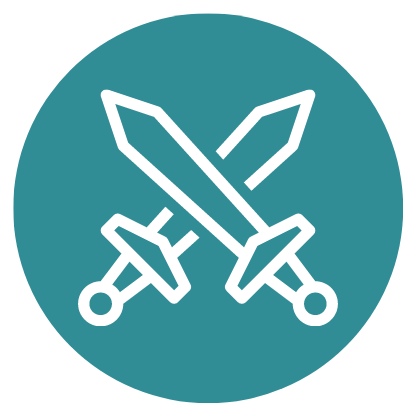Learn how to turn bad teams into good teams and master the art of successful meetings with this video!
Evelyn From the Internets of CrashCourse is here to show us how to avoid teamwork disasters in and out of the workplace with her helpful tips on setting SMART goals, using charters and agendas, and holding productive meetings. Learn how to create a team of highly motivated individuals with complementary skills and how to hold successful meetings that don't turn into a supervillain's monologue. Discover the importance of assigning team roles to keep everyone on the same page, and how to generate great ideas without having to brainstorm. Avoid team disasters with these easy tips and tricks!
Learning Outline
1. Make sure everyone is on the same page and set SMART goals.
2. Create a charter before starting the project to set the tone for the team.
3. Ask yourself if a meeting is necessary and only include people who are directly involved.
4. Brainstorming is usually counterproductive and can lead to more meetings.
5. Prior to the meeting, assign roles and provide an agenda.
6. Make sure everyone gets a chance to speak, but don't let one person dominate the conversation.
7. Consider alternate methods of communication, such as emails or memos, if appropriate.
Instructional Content
Teamwork is an essential part of many businesses and organizations, but it can be challenging to get a team to run smoothly. Without careful planning and communication, team projects can go awry, resulting in wasted time and resources. However, there are steps you can take to ensure a successful outcome.
The first step is to make sure everyone is on the same page. Set specific, measurable, ambitious, realistic, and timely (SMART) goals for the team and individual members. Create a charter that outlines the goals, responsibilities, and rules of the team. This will help to avoid any misunderstandings or conflict down the line.
When it’s time to have a team meeting, only invite people who need to be there. Ask yourself if the meeting is necessary and if it could be done remotely. If you need to brainstorm ideas, do the research beforehand and come to the meeting with a plan or agenda. Assigning roles such as a task leader and a relationship leader can help keep the meeting on track.
These steps can help you avoid team projects disasters and set your team up for success. With clear goals and communication, you can ensure that everyone is on the same page and that the project is completed efficiently.
Productivity
Productivity is essential when it comes to team building and conflict resolution. Learning how to properly optimize productivity in each of these scenarios can help ensure that teams are working together efficiently and effectively. The video, "How to Avoid Teamwork Disasters: Crash Course Business - Soft Skills 12", and transcript, focused on the elements that make a successful team. By setting SMART goals, creating a team charter, and holding effective meetings, teams can ensure that they are on the same page and working together in a productive manner.
When it comes to setting SMART goals, teams should ensure that they are specific, measurable, ambitious, realistic, and timely. Each individual should have their own individual SMART goals that line up with the team’s bigger picture. This ensures that everyone is working towards the same goal and that their individual contributions are meaningful and effective. Additionally, teams should create a charter that outlines the goals, responsibilities, and rules of the team. This will help to set the tone for the project and ensure that everyone is on the same page from the start.
When it comes to holding effective meetings, teams should consider if everyone needs to be in the same room together, or if it can be accomplished remotely. If a meeting is necessary, it is important to only include those who are directly involved in the project or affected by the decisions. Additionally, brainstorming in groups is not the most effective way to generate ideas. Instead, teams should do their own individual research and come together to discuss the pros and cons of each option. Using an agenda at the meeting can help to keep the meeting on track and ensure that it doesn’t go over time. Assigning roles, such as a task leader and relationship leader, can also help to ensure that the meeting stays organized and productive.
By following these tips, teams can ensure that they are working together in an efficient and effective manner. By setting SMART goals and creating a charter, teams can ensure that everyone is on the same page from the start. Additionally, by only having necessary meetings, using an agenda, and assigning roles, teams can optimize their productivity in each meeting and ensure that each team member is contributing equally.
Teamwork
Teamwork is an invaluable skill in both personal growth and professional development. It's an important aspect of upskilling that can help you achieve success in many areas of life. The video "How to Avoid Teamwork Disasters" provides us with excellent advice on how to make the most of the teamwork experience.
The video explains that a good team is like the Avengers before The Winter Soldier. Every team member is motivated and has complementary skills. Everyone is on the same page, pulls their own weight, and has individual goals that line up with the bigger picture. Having a charter, which outlines the team's goals and responsibilities, can help ensure everyone is on the same page and prevent any problems from arising.
Meetings are also an important part of team dynamics. Studies show that 71% of 182 managers found meetings to be unproductive and inefficient. Asking yourself if everyone needs to be in the same room, and if the meeting will accomplish anything that couldn't be done remotely, can help keep meetings effective. Brainstorming can also be an unproductive, time-wasting event. Instead, it's better to have team members do research and come together to discuss their ideas in order to come up with the best plan. Assigning roles to team members, such as a task leader or a relationship leader, can help keep meetings productive and on task.
Overall, the video provides great advice on how to make the most of the teamwork experience. Properly setting goals, having a charter, assigning roles, and ensuring meetings are effective are all key elements in avoiding teamwork disasters and making sure everyone has a positive experience. With the right tools and know-how, anyone can become an expert in teamwork and use it to their advantage for personal growth and professional development.
Team Building
Team building is a key skill to have for personal growth and professional development. It is essential for successful collaborations and meaningful relationships. The video “How to Avoid Teamwork Disasters” from Crash Course Business offers excellent advice for preventing team disasters.
The video outlines the differences between good and bad teams. Good teams are motivated and have complementary skills, are on the same page, and are accountable to each other. Bad teams lack these qualities and can be detrimental to team success.
The video suggests creating a charter to set team responsibilities, goals, and rules before starting a project. This is like a roommate agreement and can help prevent future problems. It’s important to only include necessary team members in meetings and to make sure they are productive. Holding too many unnecessary meetings can lead to feelings of exclusion and can be a waste of time.
Brainstorming can also be a disaster if done improperly. The video suggests doing research on your own and then pitching the ideas in a meeting. This can be more productive than a brainstorming session. It’s also important to assign roles for the meeting, like a task leader and a relationship leader, to make sure the agenda is accomplished and everyone gets a chance to speak.
Upskilling yourself in team building is essential for success. Following the advice in the video can help you avoid team disasters and maximize productivity. Utilizing the tips from the video and applying them to your own team can help you have successful collaborations and meaningful relationships.
Conflict Resolution
Conflict resolution is an important part of personal growth and professional development. To upskill yourself in this area, it is helpful to consider the advice from the video, How to Avoid Teamwork Disasters: Crash Course Business - Soft Skills 12. This video discusses the differences between good and bad teams, and provides insight on how to avoid common pitfalls.
Good teams have goals that are SMART (specific, measurable, ambitious, realistic, and timely), and members who motivate and hold each other accountable for their actions. Bad teams are unorganized, have individual goals that don't match the group's, and lack accountability. To turn a bad team into a good team, it is important to have a charter that sets team responsibilities and goals.
When it comes to meetings, 71% of 182 managers surveyed in one study said that meetings were unproductive and inefficient. To avoid this, it is important to ask yourself if a meeting is truly necessary, and if so, who should be in attendance. Additionally, brainstorming is not always effective. A better alternative is to have each person research and present their ideas in their own time.
For meetings, it is helpful to have an agenda to ensure that the meeting is productive and stays on track. Assigning team roles to ensure the meeting runs smoothly is also beneficial. Finally, it is important to remember that a meeting is not a presentation and to not dominate the conversation.
By considering the advice in this video, one can upskill themselves in conflict resolution and become more successful in personal growth and professional development.
For Learners
Watching the video ‘How to Avoid Teamwork Disasters: Crash Course Business - Soft Skills 12’ is beneficial for personal growth and professional development as a lifelong learner. The video explains the strategies to become more successful in collaborative projects, such as setting SMART goals, how to create a charter, how to plan for meetings, and how to assign team roles. Knowing how to effectively work with a team can be the difference between success and failure in the workplace.
The positive benefit of watching this video is that it can help the viewers become better team players and gain valuable knowledge on how to make the most of group projects. Additionally, viewers can learn how to navigate group dynamics and how to use their own skills to benefit the team. By watching this video, viewers can learn how to become a better team player and gain the skills necessary to be successful in the workplace.
The negative detriment to not watching this video is that the viewers may miss out on the valuable knowledge and skills that can be gained from it. Without this knowledge and skills, viewers may find it difficult to be successful in their team projects. In addition, viewers may not know how to effectively navigate group dynamics and may struggle to work with their team members.
Using the ‘what’s in it for me’, ‘what’s in it for them’, ‘what’s in it for us’, and ‘what’s in it for the world’ approach to learning the content of this video will benefit you as a learner for personal growth and professional development. As a learner, you can gain skills that can help you become a better team player and be successful in group projects. Additionally, you can gain the knowledge necessary to effectively work with your team members, which can help you achieve success in the workplace. Furthermore, you can use the skills and knowledge gained from this video to help your team reach its goals and to help the world become a better place.
For Employers
Employers can benefit from learning the content of this video because it provides the tools to create successful teams and avoid common teamwork disasters. This video provides a comprehensive approach to understanding the fundamentals of good teamwork and the steps to take to ensure that teams operate efficiently, productively, and effectively. By understanding the importance of setting SMART goals, creating team charters, and holding productive meetings, employers can create teams that are highly motivated and have complimentary skills that work together to achieve a common goal.
Differentiating yourself from your competition by learning these skills will demonstrate to customers and clients that you understand the concepts of effective team management and that your products will be produced with a focus on quality and efficiency. Customers will perceive you and your products more successfully if they know you understand the concepts in this video and can apply them to manage teams and projects.
By understanding the content of this video and utilizing the concepts within it, employers can experience the present benefits of successful teams, the past benefits of having avoided common team disasters, and the future benefits of having a team that is highly motivated and efficient. Employers who learn these skills will be better equipped to produce quality products and services that are highly valued by their customers and clients.
Career Path
Completing a course in Productivity based on the competencies of Teamwork, Team Building, and Conflict Resolution can help someone find their job or get promoted at their current employment by giving them the skills they need to stand out in the job market. With these credentials, they will become more employable, promotable, and purposeful than ever before.
Leveling up by watching this video and transcript can help bridge the skills gap for those looking for meaningful work in high-growth industries. The video will provide practical tips on how to create a successful team, from setting SMART goals to making sure everyone is on the same page. It will also provide guidance on how to hold successful meetings, from delegating tasks to avoiding unnecessary meetings. Additionally, it will show people how to maintain relationships within their team and how to provide equal opportunities for everyone to speak up.
By watching this video and taking the skills it teaches to heart, life-long learners can gain the knowledge and the confidence to take their careers to the next level. With these income-producing skills, they will become more marketable to employers and more successful at their current jobs. They will also become equipped to make a real difference in their industry, setting themselves apart as leaders with the skills to create and maintain successful teams.
Meaning
"The greatest good you can do for another is not just to share your riches, but to reveal to him his own." - Benjamin Disraeli
The concept of teamwork and collaboration is essential for success in any field. Working together can help you maximize your potential and achieve shared goals. In this video, we learn how to avoid the common pitfalls of teamwork, such as poor communication and unequal workloads. By setting SMART goals and creating a team charter, you can ensure everyone is on the same page and motivated to help reach the desired outcome. Establishing an agenda and assigning roles can also help ensure that meetings are productive and efficient. Ultimately, it is important to remember that the greatest good you can do for your team is not just to share your resources, but to help them recognize their own potential. By fostering an environment of collaboration, you can help your team members reach their highest potential and achieve success.
Takeaway
The most important key takeaway from this video is to ensure that everyone is on the same page before starting a project, by setting SMART goals and creating a charter. This helps to ensure that each team member is motivated, has complementary skills, and can hold each other accountable.










 29 Creds - Productivity
29 Creds - Productivity



